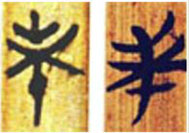I Ching, Yijing or Zhou Yi
"Oracle of the moon": © 2000 LiSe
 Yi Jing, Oracle of the Moon
Yi Jing, Oracle of the Moon

Hex.63-64, the voyage of the Sun
Februari 1, 2020
In a discussion with Martijn de Grunt he said, "fire and water also represent Sun and Moon. I think it is the reason their combinations are the last two hexagrams, completing the first two of Heaven and Earth. They close the cycle".
It made me think of the sun traveling through the primeval ocean.
 Hex.63, trigram Fire, the sun, below trigram Water. It is the end of the day. The sun crossed heaven and now she is on the horizon, sinking into the primeval ocean. The evening is when you can look back on everything you accomplished.
Hex.63, trigram Fire, the sun, below trigram Water. It is the end of the day. The sun crossed heaven and now she is on the horizon, sinking into the primeval ocean. The evening is when you can look back on everything you accomplished. Hex.64, trigram Water below trigram Fire, the sun. The time of Wei, 'not yet', is around 3 PM or the month July. A moment of no results yet but lots of possibilities. The day or summer winds down but harvest-time has yet to arrive.
Hex.64, trigram Water below trigram Fire, the sun. The time of Wei, 'not yet', is around 3 PM or the month July. A moment of no results yet but lots of possibilities. The day or summer winds down but harvest-time has yet to arrive.In hex.63 the sun has crossed the heavens and is going down at the Western horizon. Every night she travels underneath the earth, through the primeval waters, to the Eastern horizon, where she comes up again.
The name of 63 is Ji Ji, 'already cross-river', already across. The first Ji is someone exhaling, yawning or belching: to complete, finish, exhaust(ion), end, the whole, entirely, since, after, stability, particle of perfect tense, total solar eclipse (eat up). A dverb: all, already, even if, since, conjunctions, parallel, both.
The sun has finished the day, it is at its end.
The hexagrams share the second character, JI. It means 'crossing' or 'across', but also cross the river in the sense of coming to one's aid, relieve, help, be of help, benefit.
The name of 64 is Wei Ji, 'not-yet cross-river', not yet across. Wei, not-yet, is a lush tree. Meanings: not-yet, taste (like 'inkling'), future, never, not yet, no, not right, that's not all, shortage, insufficient, question mark. Wei-month is June, the month of solstice, when growth ends and fruits and grain start to ripen, and the hour of 1-3 PM, when energy goes down, even though the day is not over yet.
 Some Wei-characters look like a tree making new shoots, or indicating that growth reached its peak and now ends. Things are still far from being finished. Nothing has been fixed yet, there are still possibilities and chances. The bees have done their job, the petals fall off. No fruits yet, autumn with its harvest has yet to come.
Some Wei-characters look like a tree making new shoots, or indicating that growth reached its peak and now ends. Things are still far from being finished. Nothing has been fixed yet, there are still possibilities and chances. The bees have done their job, the petals fall off. No fruits yet, autumn with its harvest has yet to come.
His text is about the meaning of Yi, change, but it also makes sense for the last two hexagrams.
On his website shantena.com, on the page "The name of the book", he says about Yi:
"... "The essential word in the book’s name is yi, which means, amongst other things, “change.” But the yi the title of the book points to is not primarily the regular change involved in the cycle of day and night, in the succession of the seasons or in the organic growth of living things. Yi refers in the first place to unpredictable change."
And: ... We have yi when things are off track, when chaos irrupts into our life and the usual bearings no longer suffice for orientation. We all know that such times can be very fertile – and extremely painful, disconcerting and full of anxiety. Modern chaos theory pays particular attention to these murky transitions, by which forms transmute into each other. Life itself arises at the boundary between order and chaos: it requires both, it is a daughter of both. On the side of perfect order there is only dead stability, inertia, symmetry, thermodynamic equilibrium. Nothing very interesting can happen there: everything is too predictable, it resembles death more than life. But the side of total disorder is not very interesting either: forms appear and disappear too quickly, there is a total lack of symmetry, everything is too unpredictable. It is on the edge between order and chaos that the subtle dance of life takes place."
Shantena talks about Yi, the name of the book, but it seems the last two hexagrams express this never-ending change between order and chaos, which is the warp of the Yijing.
Hex.63-64: "Life itself arises at the boundary between order and chaos: it requires both, it is a daughter of both".